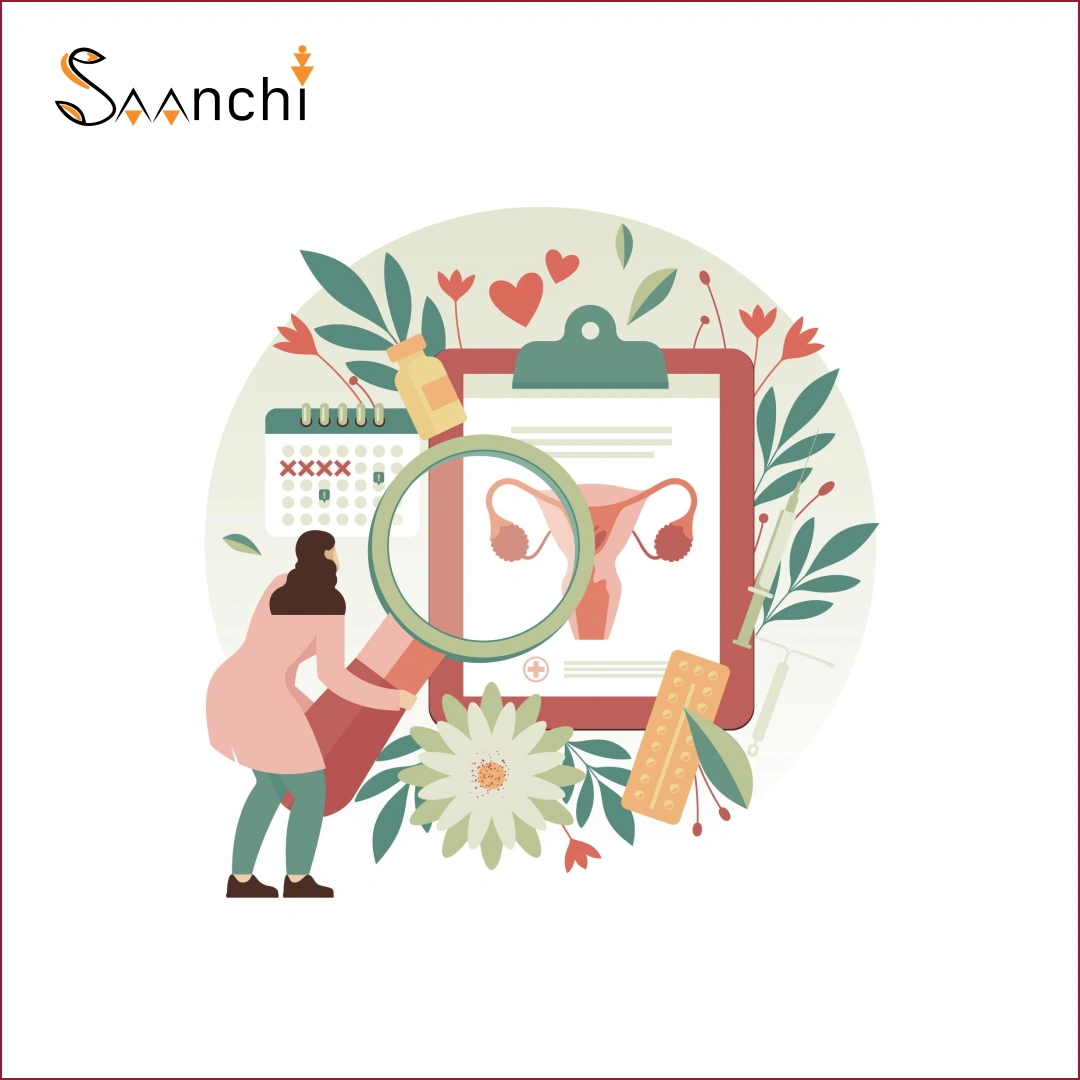Polycystic Ovarian Syndrome (PCOS) is a common hormonal disorder that affects millions of women worldwide. It disrupts the normal functioning of the ovaries, leading to irregular menstrual cycles, excessive hair growth, acne, and fertility issues. While the exact cause of PCOS remains unclear, hormonal imbalances and genetic factors play a significant role. Understanding Polycystic Ovarian Syndrome – Symptoms and Causes is essential to help women manage this condition effectively.
What is Polycystic Ovarian Syndrome (PCOS)?
PCOS is a condition where the ovaries produce higher-than-normal levels of androgens (male hormones), leading to a hormonal imbalance. This imbalance can prevent ovulation, resulting in missed or irregular periods. Additionally, small cysts may form on the ovaries, but the presence of these cysts is not necessary for a PCOS diagnosis.
Women with Polycystic Ovarian Syndrome often struggle with insulin resistance, weight gain, and metabolic disorders, increasing their risk of type 2 diabetes and cardiovascular diseases.
What Causes Polycystic Ovarian Syndrome (PCOS)?
Although the exact cause of Polycystic Ovarian Syndrome is unknown, several factors contribute to its development:
- Hormonal Imbalances
- High Androgen Levels: Androgens, also known as male hormones, are present in small amounts in women. Women with PCOS produce excessive androgens, leading to symptoms like facial hair growth, acne, and irregular ovulation.
- Insulin Resistance: Insulin helps regulate blood sugar, but in women with PCOS, the body’s cells do not respond effectively to insulin. As a result, the body produces more insulin, which triggers the ovaries to produce excess androgens.
- Low Progesterone: A deficiency in progesterone can cause irregular menstrual cycles and heavy bleeding.
- Genetic Factors
PCOS tends to run in families. If a mother or sister has Polycystic Ovarian Syndrome, there is a higher chance of developing the condition.
- Inflammation
Studies suggest that chronic low-grade inflammation in the body can contribute to higher androgen levels, worsening PCOS symptoms.
Symptoms of Polycystic Ovarian Syndrome (PCOS)
The symptoms of Polycystic Ovarian Syndrome can vary from mild to severe. Some of the most common symptoms include:
- Irregular Periods
Women with PCOS often experience irregular or absent menstrual cycles due to disrupted ovulation.
- Excess Hair Growth (Hirsutism)
Over 70% of women with PCOS experience excessive hair growth on the face, chest, back, and stomach due to high androgen levels.
- Acne and Oily Skin
Elevated androgen levels increase oil production in the skin, leading to acne breakouts on the face, chest, and back.
- Weight Gain and Difficulty Losing Weight
Around 80% of women with PCOS struggle with obesity and find it challenging to lose weight due to insulin resistance.
- Darkened Skin Patches
PCOS can cause dark patches of skin, particularly around the neck, underarms, and groin.
- Hair Thinning or Male-Pattern Baldness
High levels of androgens can cause hair thinning or male-pattern baldness in women with PCOS.
- Infertility
PCOS is one of the most common causes of infertility in women. Irregular ovulation makes it difficult to conceive.
How Does Polycystic Ovarian Syndrome (PCOS) Affect the Body?
Women with Polycystic Ovarian Syndrome are at a higher risk of developing several health complications, including:
- Metabolic Syndrome
PCOS increases the risk of metabolic disorders, including:
- High blood sugar
- High blood pressure
- High LDL (“bad”) cholesterol and low HDL (“good”) cholesterol
These conditions raise the risk of heart disease, stroke, and type 2 diabetes.
- Sleep Apnea
Women with PCOS, particularly those who are overweight, are more likely to suffer from sleep apnea, a condition that causes breathing interruptions during sleep.
- Depression and Anxiety
Hormonal imbalances, physical symptoms, and infertility issues associated with PCOS can contribute to mental health conditions like depression and anxiety.
How is Polycystic Ovarian Syndrome (PCOS) Diagnosed?
PCOS is diagnosed based on symptoms, medical history, and physical examination. Doctors may use the following tests:
- Blood Tests
- Measure hormone levels (androgens, insulin, and progesterone)
- Check glucose levels to assess insulin resistance
- Pelvic Ultrasound
A pelvic ultrasound can help detect ovarian cysts and evaluate the uterine lining’s thickness.
- Physical Examination
Doctors may examine weight, blood pressure, and signs of excessive hair growth or skin darkening.
Treatment Options for Polycystic Ovarian Syndrome (PCOS)
Although Polycystic Ovarian Syndrome has no cure, its symptoms can be managed through lifestyle changes and medications.
- Lifestyle Modifications
- Healthy Diet: A balanced diet rich in whole grains, vegetables, and lean proteins can help manage insulin resistance and promote weight loss.
- Regular Exercise: Engaging in physical activities like walking, yoga, or strength training can improve insulin sensitivity and hormone balance.
- Weight Management: Losing even 5-10% of body weight can regulate menstrual cycles and improve fertility.
- Medications
- Birth Control Pills: Oral contraceptives help regulate menstrual cycles and lower androgen levels.
- Metformin: This medication improves insulin resistance and lowers blood sugar levels.
- Fertility Treatments: Women trying to conceive may benefit from ovulation-stimulating medications like Clomiphene or Letrozole.
- Managing Symptoms Naturally
- Reducing Stress: Practicing relaxation techniques like meditation and deep breathing can help manage hormonal imbalances.
- Avoiding Harmful Substances: Limiting alcohol, smoking, and excessive caffeine intake can improve PCOS symptoms.
Polycystic Ovarian Syndrome (PCOS) and Pregnancy Complications
Women with Polycystic Ovarian Syndrome face a higher risk of pregnancy-related complications, including:
- Gestational diabetes
- Preeclampsia
- Preterm birth
To reduce these risks, women with PCOS should seek prenatal care early and maintain a healthy lifestyle.
Final Thoughts on Polycystic Ovarian Syndrome (PCOS) – Symptoms and Causes
PCOS is a complex condition that affects women’s reproductive and metabolic health. Understanding Polycystic Ovarian Syndrome – Symptoms and Causes is the first step toward managing this condition effectively. With the right lifestyle changes, medications, and medical support, women with PCOS can lead healthy, fulfilling lives.
Saanchi – Supporting Women’s Health
Saanchi is committed to empowering women with knowledge and resources to manage health conditions like Polycystic Ovarian Syndrome. With expert guidance, lifestyle recommendations, and medical insights, Saanchi aims to help women take control of their hormonal health. Whether you’re struggling with PCOS symptoms or seeking fertility support, Saanchi provides comprehensive solutions tailored to your needs.


